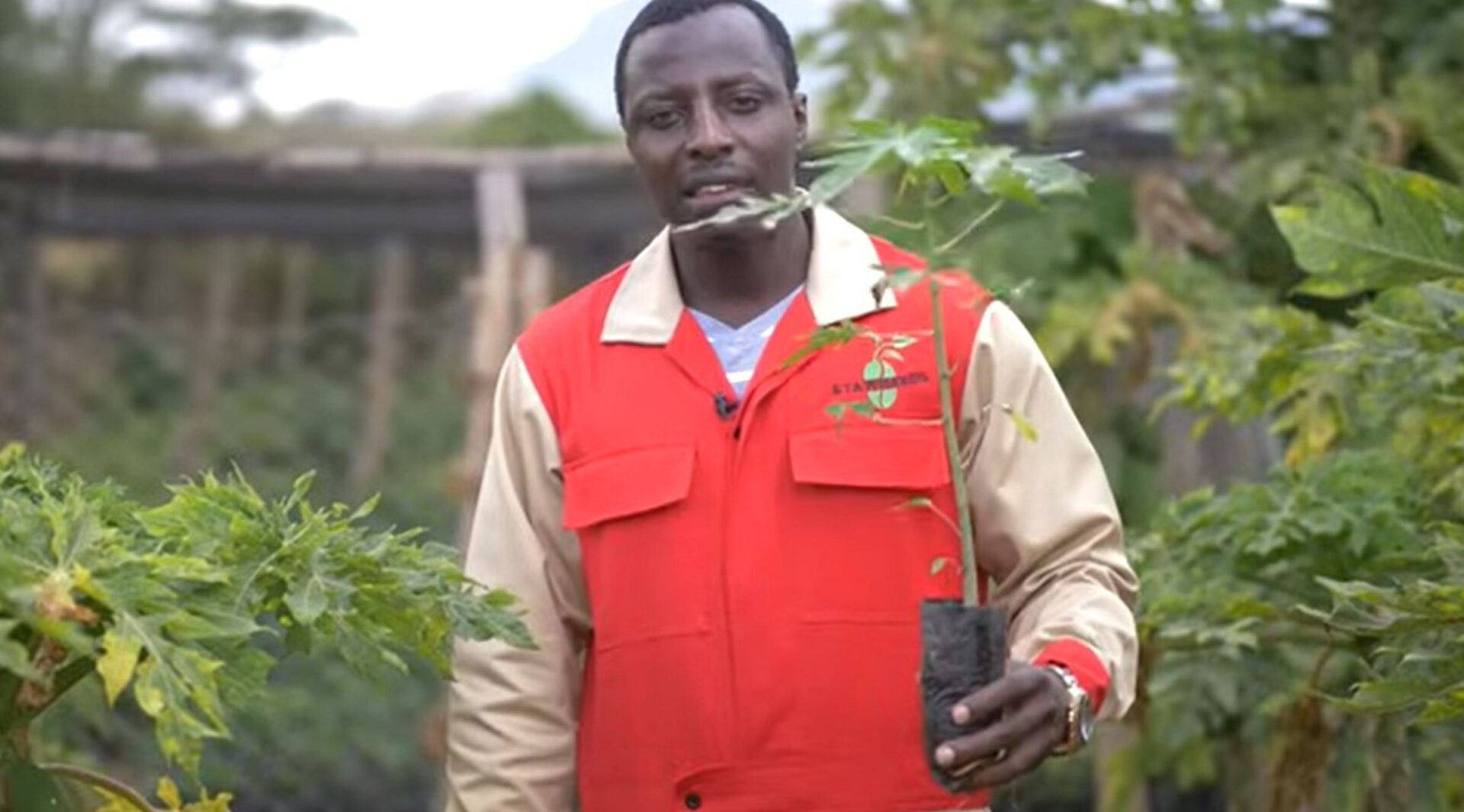Alex Kituku graduated from Egerton University in 2014 with a Bachelor’s degree in Biochemistry and Molecular Biology. Despite excelling in his academic career, Kituku’s true passion lay in farming.
He goes by the name Kituku wa Papaya on his social media platforms. Alex ventured into pawpaw farming first when he was pursuing his undergraduate. He is now the founder of Papaya Empire, a local company that champions the sale of pawpaw seeds and seedlings.
In a past interview, Kituku shared that his interest in pawpaw farming developed when he cleared his high school education.
“I have been having that passion to do pawpaw farming because I had seen farmers making money from pawpaw itself,” he said.
Kituku said that he was attracted to the pawpaw business because of the higher returns it promised. He began with 700 plants. Unfortunately, many of them turned out to be male, resulting in losses for him.
“Unfortunately, only 70 plants were female and the rest were male. That was a challenge because I was expecting to harvest from 700 plants but I have only 70,” he added.
Using the earnings from the fruits harvested from the 70 plants, Alex started researching to increase his yields. His focus was on acquiring more female plants to optimize his produce.
“I researched and four years later, I came across a company which was supplying some pawpaw seeds,” Kituku noted.
By this time, Alex had completed his studies at Egerton University and had gained work experience as a biochemist at a pharmaceutical company in EPZ, Athi River. Additionally, he had worked as a teacher under BOM terms.
He saved enough money and purchased more pawpaw plants that he planted on his farm.
“I was working for a school in Kirinyaga and I managed to save Sh. 150,000 which I used to buy the seedlings and took them to some place in Kiserian for propagation,” he narrated.
Albeit getting the right pawpaw plants, Kituku still counted losses on his second try. This time, he lost all his plants. He planted pawpaw seedlings yet did not have enough water for irrigation.
Moreover, he fertilized the plants with manure resulting in a high temperature in the root medium. Unfortunately, this led to rapid rotting of the plants. Within one year, all the plants had rotted and died.
“I didn’t give up because I had a passion for farming this fruit. I planted again, i leased land where I did 1,000 plants and I also did another 1,000 plants on the family land,” Kituku explained.
On the third attempt, everything appeared to be going well for Kituku until heavy rains struck the country. He lost all 2,000 plants and counted huge losses.
“After flowering, we had a lot of rains and while we’re happy that we will get adequate water for the plants, however, pawpaw doesn’t need a lot of water in the root medium.”
The third time, lucky charm? Determined to turn the tide of losses, Kituku decided to pivot into the seedlings business, after he’d previously received numerous inquiries.
He spotted that farmers faced a tough time to get quality seeds and seedlings. This inspired his business which specializes in the propagation of hybrid pawpaws.
“I have specialised in nursery management so that I can supply farmers with quality and first-generation (F1) papaya seedlings. I started with pawpaws but have since extended to other fruit trees that do well in warm areas like grafted Pixie tangerines,’’ he revealed.
Lamech Kabuti: Farmer boosting harvests with own fertilizer company in his 20s
Kituku explained that hybrid pawpaw varieties mature quickly and yield lots of fruits. For instance, the improved Solo Sunrise variety, weighing less than 300g, can produce up to 200 fruits from a single plant within a year.
Among the varieties he handles is the Dwarf Calina (red-flesh pawpaw), which weighs over 1kg and can yield over 150 fruits in a year. It takes just over 6 months to get the first fruit after transplanting.
From this business, he can make sales of over Sh. 500,000, although this figure varies depending on the season. Peak seasons for seedling sales typically coincide with the onset of rainy seasons in April and October.
“During this period, I can sell as much as 5,000 seedlings a season. Other farmers use irrigation for growing and are therefore able to plant at any time of the year. The off-season sales can be as high as 500 in a month,” he stated.
https://www.youtube.com/watch?v=BtWxJTvXJTA
Did you love the story? You can also share YOUR story and get it published on Bizna Click here to get started.




